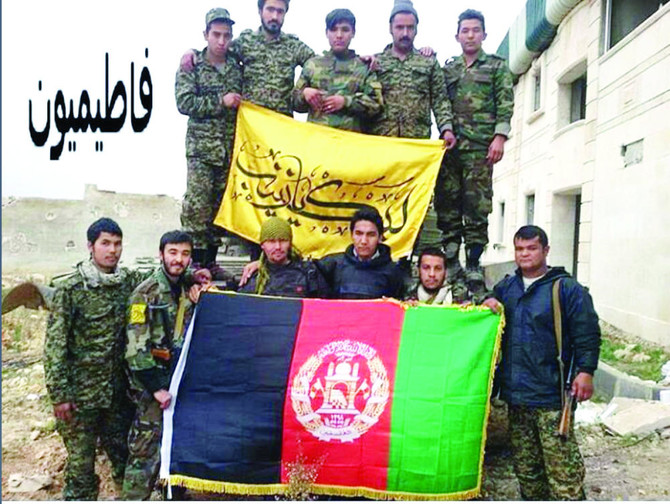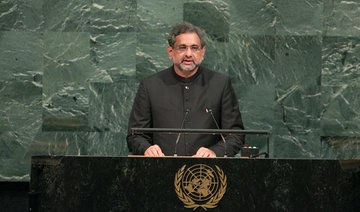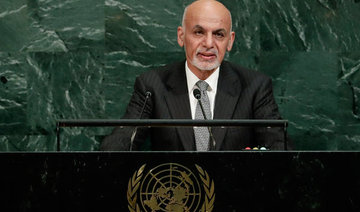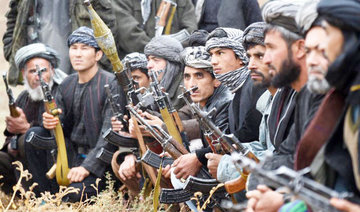KABUL: An Afghan soldier who is killed in action gets barely enough compensation to cover the funeral expense. A wounded soldier receives far less.
But the package Iran offers Afghans to fight in Syria is far more attractive: Permanent residency for the deceased’s family, accommodation and several years of monetary support for the household. A wounded Afghan mercenary receives more or less the same.
This attracts desperate and jobless Afghan refugees in Iran, as well as many in Afghanistan, to fight in support of the Syrian regime.
The main source of recruitment in Afghanistan is the peaceful yet impoverished parts of the central highlands with a predominantly Shiite population.
Some 700,000 Afghans reportedly live illegally in Iran, besides nearly a million registered refugees. This collectively provides Tehran with a breeding ground for recruitment.
Abdul Hameed, 19-year-old school graduate from Afghanistan’s Bamiyan province, fought in Syria.
Jobless and frustrated at home, he went to Iran in 2012 aged 14 and managed to get a job. But after working for a year as a laborer, he became jobless again and his savings ran out.
The war in Syria was at its peak in 2014, and a group of Afghans serving Iran’s government gave him an offer to go to Syria, which he accepted without hesitation.
“The proposal was approximately $300 a month, permanent residency in Iran and other concessions depending on whether I’d die, get injured or return safe,” Hameed told Arab News.
“We were sent by plane from Iran to Syria and settled in Aleppo. The process of recruitment isn’t compulsory. Iran doesn’t force you to go to Syria.”
In Aleppo, Hameed met fighters from other Muslim countries such as Pakistan, Iraq and Lebanon. Separate camps were designated for each country, he said.
“The Afghans were called Fatemiyun, the Pakistanis were named Zainebiyun, and the Iraqis were called Haidaris. There were 12 Iranian commanders who provided training or gave commands.”
Before joining the battlefield, the recruits undergo training involving small and heavy weaponry, as well as land mines, said Hameed.
That would be followed by a short trip to Iran, then back to Syria to face groups such as Al-Qaeda and Daesh.
“They’re beheading people and destroying our (Shiite) mosques and holy places. I’ve seen it with my own eyes,” Hameed said. Fighters from Pakistan travel overland to Iran and are then flown to Syria, he added.
Hameed’s time in Syria came to an end when one night, a large number of Afghan fighters came under sudden attack from militants.
“There was a massive attack against us. We couldn’t resist. Some 200 Afghans died that night alone,” he said.
“Me and 30 others were injured and taken to hospital in Syria, then transferred to a hospital in Iran for a month.”
After his recovery Hameed stayed in Iran for three months, but then returned home to his family, who were completely unaware of his trip to Syria.
“I was given a 10-year residency permit in Iran, but I declined it and returned home last year,” he said. Hameed has a baby now, but is jobless again.
An Afghan government official, speaking on condition of anonymity because he is not authorized to speak to the media, told Arab News: “This is a highly sensitive issue. If the government give figures and comments, Daesh will turn its attention toward Afghanistan, viewing it as the ground from where Shiites go to Syria to fight them.”
Daesh’s affiliates in Afghanistan have frequently targeted Shiite congregations and mosques in recent years.
There is no public record of when Iran began recruiting Afghans or how many have been recruited.
But Waheed Mozhad, an Afghan analyst and writer, said the number of fighters who have gone back and forth is around 10,000, and recruitment began in 2013.
Safora, a female lawmaker from Bamiyan, said some Shiite clergy in Afghanistan have aided recruitment.
“Poverty and desolation have forced people from central areas of Afghanistan to go to Syria,” she told Arab News.
“We’re totally against it, but people need food and other necessities for their families, so they go for it,” she said.
“I know people from different provinces who lost their sons in the war in Syria. I know some families who went to Iran, to get a house and other concessions promised by Tehran, after they lost a family member in Syria,” she added.
“Unfortunately, the Afghan government has done nothing to stop this recruitment or confront Tehran over the issue.”
Poverty, religious fervor push Afghans to join Iran’s war in Syria
Poverty, religious fervor push Afghans to join Iran’s war in Syria

Yemen’s Houthis claim they shot down another American drone as US strikes pound country

- The reported shootdown over Yemen’s contested Marib governorate came as airstrikes hit around Sanaa and Saada
- The US military acknowledged to The Associated Press being aware of reports of the downing of a Reaper
DUBAI: Yemen’s Houthi militia claimed Tuesday that they shot down another American MQ-9 Reaper drone, even as the US kept up its campaign of intense airstrikes targeting the group.
The reported shootdown over Yemen’s contested Marib governorate came as airstrikes hit around Sanaa, the country’s militia-held capital, and Saada, a stronghold for the Houthis.
US President Donald Trump issued a new warning to both the Houthis and their main benefactor, Iran, describing the group as having “been decimated” by the campaign of strikes that began March 15.
“Many of their Fighters and Leaders are no longer with us,” Trump wrote on his social media website Truth Social. “We hit them every day and night — Harder and harder. Their capabilities that threaten Shipping and the Region are rapidly being destroyed. Our attacks will continue until they are no longer a threat to Freedom of Navigation.”
He added: “The choice for the Houthis is clear: Stop shooting at US ships, and we will stop shooting at you. Otherwise, we have only just begun, and the real pain is yet to come, for both the Houthis and their sponsors in Iran.”
Houthis claim they downed another US drone
The militia claimed to have felled a drone in Marib governorate, home to oil and gas fields still under the control of allies to Yemen’s exiled central government. Footage released on social media showed flames in the night, with a Yemeni man claiming a drone had been shot down.
Brig. Gen. Yahya Saree, a Houthi military spokesman, separately claimed downing the MQ-9 drone in a prerecorded video message.
Saree described the militia targeting the drone with “a suitable locally manufactured missile.” The Houthis have surface-to-air missiles — such as the Iranian missile known as the 358 — capable of downing aircraft.
Iran denies arming the militia, though Tehran-manufactured weaponry has been found on the battlefield and in sea shipments heading to Yemen for the Shiite Houthi militia despite a United Nations arms embargo.
The US military acknowledged to The Associated Press being aware of reports of the downing of a Reaper, but declined to comment further.
General Atomics Reapers, which cost around $30 million apiece, can fly at altitudes over 40,000 feet (12,100 meters) and remain in the air for over 30 hours. The aircraft have been flown by both the US military and the CIA for years over Afghanistan, Iraq and now Yemen.
The Houthis claim they’ve shot down 20 MQ-9s over the country over the years, with 16 downed during the militia’ campaign over the Israel-Hamas war. The US military hasn’t acknowledged the total number of the drones it has lost there.
Intense US bombings began March 15
An Associated Press review has found the new American operation against the Houthis under Trump appears more extensive than those under former President Joe Biden, as the US moves from solely targeting launch sites to firing at ranking personnel as well as dropping bombs in cities.
The new campaign of airstrikes, which the Houthis now say have killed at least 61 people, started after the militia threatened to begin targeting “Israeli” ships again over Israel blocking aid entering the Gaza Strip. The militia have loosely defined what constitutes an Israeli ship, meaning many vessels could be targeted.
The Houthis targeted over 100 merchant vessels with missiles and drones, sinking two vessels and killing four sailors from November 2023 until January of this year. They also launched attacks targeting American warships, though none has been hit so far.
The attacks greatly raised the Houthis’ profile as they faced economic problems and launched a crackdown targeting dissent and aid workers at home amid Yemen’s decade-long stalemated war, which has torn apart the Arab world’s poorest nation.
Egyptian inmates’ ordeal in Sudan prisons

CAIRO: Prisoners held by the Rapid Support Forces in Sudan spoke on Monday of their ordeal in paramilitary detention centers.
Arrested two months after the country’s civil war began in April 2023, Egyptian traders suspected of spying for the regular army were stripped, tortured and starved, and watched as other inmates died from cholera and malaria.
“You couldn’t go two weeks without falling sick,” said Emad Mouawad, 44, who was held at the notorious Soba prison in southern Khartoum after paramilitary forces raided his home in the city.
At night, swarms of insects crawled over the prisoners. “There was nothing that made you feel human,” he said.
Ahmed Aziz, who was detained with Mouawad, said: “They would bring us hot water mixed with wheat flour. Just sticky, tasteless paste.” Water was either polluted from a well or muddy from the Nile. “If you were sick, you just waited for death,” Aziz said.
Another trader, Mohamed Shaaban, 43, said: “They stripped us naked as the day we were born. Then they beat us, insulted and degraded us.”
Back home in Egypt, the former prisoners are struggling to recover physically and mentally. “We have to try to turn the page and move on,” Shaaban said. “We have to try and forget.”
New Syrian Cabinet ‘won’t be able to satisfy everyone’

- Interim president says 23 ministers chosen for competence and expertise, not ideology
DAMASCUS: The new transitional government in the Syrian Arab Republic would aim for consensus in rebuilding the war-torn country but would “not be able to satisfy everyone,” interim President Ahmad Al-Sharaa said on Monday
The transitional 23-member Cabinet was named at the weekend, more than three months after Sharaa’s forces led an offensive that toppled dictator Bashar Assad. The new authorities were seeking to reunite and rebuild the country and its institutions after nearly 14 years of civil war, Sharaa told a gathering at the presidential palace broadcast on Syrian television after Eid Al-Fitr prayers.
“A new history is being written for Syria ... we are all writing it,” he said.
Sharaa said ministers had been chosen for competence and expertise, “without ideological or political orientations.” The government’s composition took into consideration “the diversity of Syrian society” while rejecting a quota system for religious or ethnic minorities, instead opting for “participation,” he said.
Three killed in Israeli strike targeting Hezbollah militant in Beirut

- Under the terms of the ceasefire, Israel was due to complete its withdrawal from Lebanon by February 18 after missing a January deadline, but it has kept troops in five places it deems “strategic”
BEIRUT: At least three people were killed and seven wounded in an Israeli airstrike on Beirut’s southern suburbs early on Tuesday, the Lebanese health ministry said, further testing a shaky four-month ceasefire between Israel and the Iran-aligned group.
The Israeli military said in a statement that it attacked a Hezbollah militant “who had recently directed Hamas operatives and assisted them.”
There was no immediate statement from Hezbollah on the identity of the target.
Israel resumed a ground and air campaign in the Gaza enclave last month, demanding that Hamas, the Palestinian militant group, lay down its arms.
The strike in Beirut appeared to have damaged the upper three floors of a building in the southern suburbs of the Lebanese capital, a Hezbollah stronghold known as the Dahiyeh, a Reuters reporter at the scene said, with the balconies of those floors blown out. The glass on the floors below was intact, indicating a target strike. Ambulances were at the scene to recover casualties.
There was no evacuation warning issued for the area ahead of the strike, and families fled in the aftermath to other parts of Beirut, according to witnesses.
The November truce halted the year-long conflict and mandated that southern Lebanon be free of Hezbollah fighters and weapons, that Lebanese troops deploy to the area and that Israeli ground troops withdraw from the zone. But each side accuses the other of not entirely living up to those terms.
The US-brokered ceasefire has looked increasingly flimsy lately. Israel delayed a promised troop withdrawal in January and said in March that it had intercepted rockets fired from Lebanon, which led it to bombard targets in Beirut’s southern suburbs and southern Lebanon.
Hezbollah has denied any involvement in the rocket firings.
The US State Department did not immediately respond to a request for comment on the latest attack.
The war in Gaza has killed more than 50,000 Palestinians, according to Palestinian health authorities. The campaign began on Oct. 7, 2023 when Hamas militants stormed across the border, and Israel said the militants killed more than 1,200 people, mostly civilians, and took some 250 people into captivity in Gaza.
Trump says ‘real pain is yet to come’ for Houthis, Iran

- The Houthis began targeting shipping after the start of the Gaza war, claiming solidarity with Palestinians
- Trump’s threat comes as his administration battles a scandal over the accidental leaking of a secret text chat by senior security officials on the Yemen strikes
WASHINGTON: US President Donald Trump vowed Monday that strikes on Yemen’s Houthis will continue until they are no longer a threat to shipping, warning the rebels and their Iranian backers of “real pain” to come.
“The choice for the Houthis is clear: Stop shooting at US ships, and we will stop shooting at you. Otherwise, we have only just begun, and the real pain is yet to come, for both the Houthis and their sponsors in Iran,” Trump said on his Truth Social platform.
Shortly after Trump’s threat, Yemeni rebel media said two US strikes Monday hit the island of Kamaran, off the Hodeida coast.
Houthi-held parts of Yemen have faced near daily attacks since the US launched a military offensive on March 15 to stop them threatening vessels in key maritime routes. The first day alone, US officials said they killed senior Houthi leaders, while the rebels’ health ministry said 53 people were killed.
Since then, rebels have announced the continued targeting of US military ships and Israel.
In his post Monday, Trump added that the Houthis had been “decimated” by “relentless” strikes since March 15, saying that US forces “hit them every day and night — Harder and harder.”
Trump’s threat comes as his administration battles a scandal over the accidental leaking of a secret text chat by senior security officials on the Yemen strikes.
It also comes amid a sharpening of Trump’s rhetoric toward Tehran, with the president threatening that “there will be bombing” if Iran does not reach a deal on its nuclear program.
The Houthis began targeting shipping after the start of the Gaza war, claiming solidarity with Palestinians.
Houthi attacks have prevented ships from passing through the Suez Canal, a vital route that normally carries about 12 percent of world shipping traffic. Ongoing attacks are forcing many companies into a costly detour around the tip of southern Africa.
“Our attacks will continue until they are no longer a threat to Freedom of Navigation,” Trump said.
The rising rhetoric from the Trump administration comes as it copes with the phone text scandal.
The Atlantic magazine revealed last week that its editor — a well-known US journalist — was accidentally included in a chat on the commercially available Signal app where top officials were discussing the Yemen air strikes.
The officials, including Trump’s National Security Adviser Mike Waltz and Defense Secretary Pete Hegseth, discussed details of air strike timings and intelligence — unaware that the highly sensitive information was being simultaneously read by a member of the media.
Trump has rejected calls to sack Waltz or Hegseth and branded the scandal a “witch hunt.”
“This case has been closed here at the White House as far as we are concerned,” White House Press Secretary Karoline Leavitt told reporters on Monday.



















